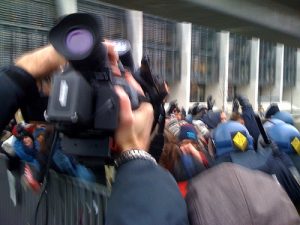As police departments around the country are increasingly caught up in tussles with members of the public who record their activities, the U.S. Justice Department has come out with a strong statement supporting the First Amendment right of individuals to record police officers in the public discharge of their duties.
In a surprising letter (PDF) sent on Monday to attorneys for the Baltimore Police Department, the Justice Department also strongly asserted that officers who seize and destroy such recordings without a warrant or without due process are in strict violation of the individual’s Fourth and Fourteenth Amendment rights.
The letter was sent to the police department as it prepares for meetings to discuss a settlement over a civil lawsuit brought by a citizen who sued the department after his camera was seized by police.
In the lawsuit, Christopher Sharp alleged that in May 2010, Baltimore City police officers seized, searched, and deleted the contents of his mobile phone after he used it to record them as they were arresting a friend of his.
Last year, the Baltimore Police Department published a General Order to officers explaining that members of the public have a right to record their activity in public, but the Justice Department said in its 11-page letter this week that the order didn’t go far enough and pointed out several areas where it should clarify and assert more strongly the rights that individuals possess.
The right to record police officers in the public discharge of their duties was essential to help "engender public confidence in our police departments, promote public access to information necessary to hold our governmental officers accountable, and ensure public and officer safety," wrote Jonathan Smith, head of the Justice Department’s Special Litigation Section.
Smith cited the 1991 videotaped assault of Rodney King while he was being beaten by law enforcement officers as an incident that "exemplifies this principle" of public oversight.



 Loading comments...
Loading comments...
